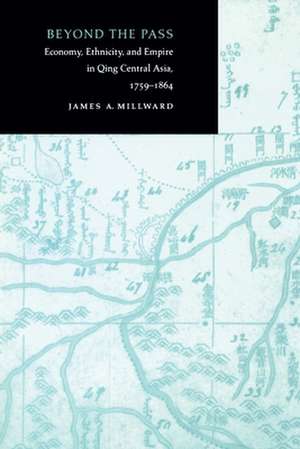Beyond the Pass: Economy, Ethnicity, and Empire in Qing Central Asia, 1759-1864
Autor James Millwarden Limba Engleză Paperback – 24 mar 2016
As analysis of the revenue available to Qing garrisons in Xinjiang reveals, imperial control over the region in the eighteenth and nineteenth centuries depended upon sizeable yearly subsidies from China. In an effort to satisfy criticism of their expansion into Xinjiang and make the territory pay for itself, the Qing court permitted local authorities great latitude in fiscal matters and encouraged the presence of Han and Chinese Muslim merchants. At the same time, the court recognized the potential for unrest posed by Chinese mercantile penetration of this Muslim, Turkic-speaking area. They consequently attempted, through administrative and legal means, to defend the native Uyghur population against economic depredation. This ethnic policy reflected a conception of the realm that was not Sinocentric, but rather placed the Uyghur on a par with Han Chinese.
Both this ethnic policy and Xinjiang’s place in the realm shifted following a series of invasions from western Turkestan starting in the 1820’s. Because of the economic importance of Chinese merchants and the efficacy of merchant militia in Xinjiang, the Qing court revised its policies in their favor, for the first time allowing permanent Han settlement in the area. At the same time, the court began to advocate provincehood and the Sinicization of Xinjiang as a resolution to the perennial security problem. These shifts, the author argues, marked the beginning of a reconception of China to include Inner Asian lands and peoples—a notion that would, by the twentieth century, become a deeply held tenet of Chinese nationalism.
Both this ethnic policy and Xinjiang’s place in the realm shifted following a series of invasions from western Turkestan starting in the 1820’s. Because of the economic importance of Chinese merchants and the efficacy of merchant militia in Xinjiang, the Qing court revised its policies in their favor, for the first time allowing permanent Han settlement in the area. At the same time, the court began to advocate provincehood and the Sinicization of Xinjiang as a resolution to the perennial security problem. These shifts, the author argues, marked the beginning of a reconception of China to include Inner Asian lands and peoples—a notion that would, by the twentieth century, become a deeply held tenet of Chinese nationalism.
| Toate formatele și edițiile | Preț | Express |
|---|---|---|
| Paperback (1) | 268.43 lei 6-8 săpt. | |
| Stanford University Press – 24 mar 2016 | 268.43 lei 6-8 săpt. | |
| Hardback (1) | 782.83 lei 6-8 săpt. | |
| Stanford University Press – 31 mai 1998 | 782.83 lei 6-8 săpt. |
Preț: 268.43 lei
Nou
Puncte Express: 403
Preț estimativ în valută:
51.38€ • 55.83$ • 43.19£
51.38€ • 55.83$ • 43.19£
Carte tipărită la comandă
Livrare economică 21 aprilie-05 mai
Preluare comenzi: 021 569.72.76
Specificații
ISBN-13: 9781503600621
ISBN-10: 1503600629
Pagini: 380
Dimensiuni: 127 x 203 x 20 mm
Greutate: 0.54 kg
Editura: Stanford University Press
Colecția Stanford University Press
ISBN-10: 1503600629
Pagini: 380
Dimensiuni: 127 x 203 x 20 mm
Greutate: 0.54 kg
Editura: Stanford University Press
Colecția Stanford University Press
Recenzii
—Peter C. Perdue, —Massachusetts Institute of Technology,
Notă biografică
James Millward is Assistant Professor of History at Georgetown University. This is a much-revised version of his 1993 Stanford doctoral dissertation. He has previously published two articles in scholarly journals and a chapter in our recent multi-author work Remapping China.
Descriere
This book examines the fiscal and ethnic policies of the Qing empire in a region that constitutes the westernmost sixth of the People's Republic of China, showing how policies changed as a result of declining dynastic resources and the growing importance of Chinese merchants on the frontier.














